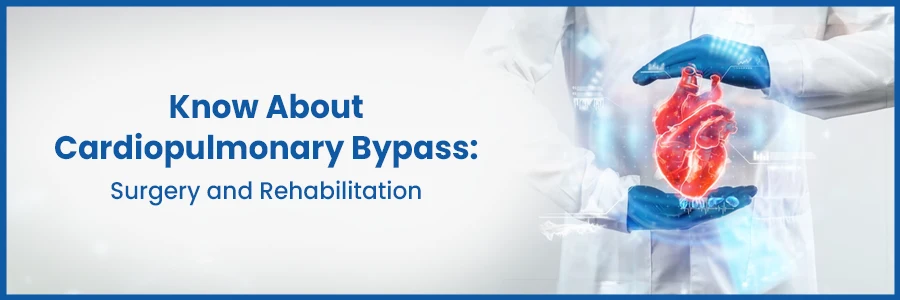- Cardiology 84
- Dermatology 45
- Endocrinology 33
- ENT 16
- Fertility 190
- Gastroenterology 78
- General-Medicine 81
- Gynecology 80
- Hematology 19
- Infectious-Diseases 33
- Neurology 52
- Oncology 34
- Ophthalmology 23
- Orthopedics 69
- Pediatrics 31
- Procedure 23
- Public-Health 144
- Pulmonology 59
- Radiology 8
- Urology 68
- Wellness 161
- Woman-and-child 77

Know About Cardiopulmonary Bypass, Surgery & Rehabilitation
Cardiopulmonary bypass is a surgery that redirects blood flow away from your heart and lungs. The terms "cardio" and "pulmonary" mean your heart and lungs accordingly. The term "bypass" refers to avoiding something by moving around it. Cardiopulmonary bypass allows your blood to bypass your heart and lungs during the operations.
Instead of passing through your heart and lungs, your blood is directed to a machine outside. This is a cardiopulmonary bypass machine, sometimes known as a heart-lung machine. It performs the functions of your heart and lungs. These tasks include supplying oxygen to your blood, reducing carbon dioxide from your blood, and finally, introducing this refreshed blood into your body.
Who Needs a Cardiopulmonary Bypass?
Individuals who have the following surgeries may require the use of cardiopulmonary bypass:
- Cardiac Surgery
- Coronary Artery Bypass Grafting (CABG)
- Valve Repair or Replacement
- Heart Transplantation
- Aortic Aneurysm Repair
- Complex Cardiac Procedures
- Congenital Heart Defects
Understanding the Cardiopulmonary Bypass Pump
A cardiopulmonary bypass pump, also known as a heart-lung machine, is a medical device used during some surgeries, particularly those impacting the heart. This equipment helps surgeons when they need to repair or replace a part of the heart. It temporarily takes over the heart's function by pumping blood, supplying oxygen, and allowing surgeons to work on the heart while it is not beating. It operates as an alternative to the heart and lungs. In simple terms, it keeps the blood moving and filled with oxygen while the heart is being operated on.
Cardiopulmonary Bypass Surgery
Cardiopulmonary Bypass Surgery is a highly specialized surgery that provides CPB as a lifeline for people who are suffering from severe heart diseases. This procedure or surgery is usually used in open-heart surgeries like coronary artery bypass grafting (CABG), heart valve repairs, and heart transplants. Surgeons gain unmatched access to the diagnosed area by temporarily stopping the heart and redirecting blood flow, allowing exact repair or replacement of weak cardiac components.
Advantages of Cardiopulmonary Bypass Surgery
- Facilitating complex heart surgeries: By taking over the heart and lung operation, doctors gain a controlled environment in which to perform complex treatments.
- Improved survival rates: Cardiopulmonary bypass surgery has considerably enhanced survival rates in people with severe cardiac conditions.
- Improving quality of life: Patients who have had successful surgery often have improved cardiac and respiratory performance, allowing them to live healthier lives.
Cardiopulmonary Rehabilitation
Cardiopulmonary Rehabilitation is similar to having a personalized plan for getting back on your feet after heart surgery or disease. This program focuses on regaining strength, developing heart-healthy habits, and giving the support you require during your recovery journey.
What to Expect from Cardiopulmonary Rehabilitation:
- Physical exercise: You will get a customized workout plan designed to slowly regain your energy and stamina.
- Heart-healthy education: Learn heart-healthy habits including maintaining a balanced diet and effectively managing stress.
Emotional support: Our healthcare team, exercise and nutrition specialists, physical therapists, and counselors may all assist you with cardiac rehabilitation. Successful surgery can enhance patients' cardiac and respiratory performance, allowing them to live healthier lives.
Ready to take control of your health journey? Book your appointment now and start your path towards wellness today!
Book an AppointmentFrequently Asked Questions
CABG (Coronary Artery Bypass Grafting) is a surgical procedure to bypass blocked coronary arteries, whereas cardiopulmonary bypass (CPB) is a technique that temporarily takes over the function of the heart and lungs during open-heart surgery, including CABG.
No, cardiopulmonary bypass (CPB) is used during cardiac surgery to support heart and lung function temporarily. ECMO (Extracorporeal Membrane Oxygenation) is used for longer-term support outside of surgery, providing both cardiac and respiratory support.
Complications of cardiopulmonary bypass (CPB) can include bleeding, infection, kidney injury, neurological issues, and inflammatory responses.
CPB can lead to lung injury due to factors such as inflammation, altered blood flow patterns, and exposure of the lungs to non-physiological conditions during the bypass process.
After effects may include fatigue, cognitive changes, lung dysfunction, inflammation, and potential complications like infections or bleeding, depending on individual health and the specifics of the surgery.

- Cardiology 2132
- Dermatology 168
- Endocrinology 135
- ENT 97
- Fertility 217
- Gastroenterology 232
- General 478
- General-Medicine 1685
- Gynecology 169
- Hematology 85
- Infectious-Diseases 208
- Neurology 207
- Oncology 345
- Ophthalmology 65
- Orthopedics 187
- Pediatrics 83
- Procedure 72
- Public-Health 209
- Pulmonology 126
- Radiology 13
- Second Opinion 311
- Urology 294
- Wellness 600
- Woman-and-child 447
- Others 10217
Related Blogs
If you have any questions, please fill out the enquiry form or call us, and we will get back to you promptly.
040-68334455